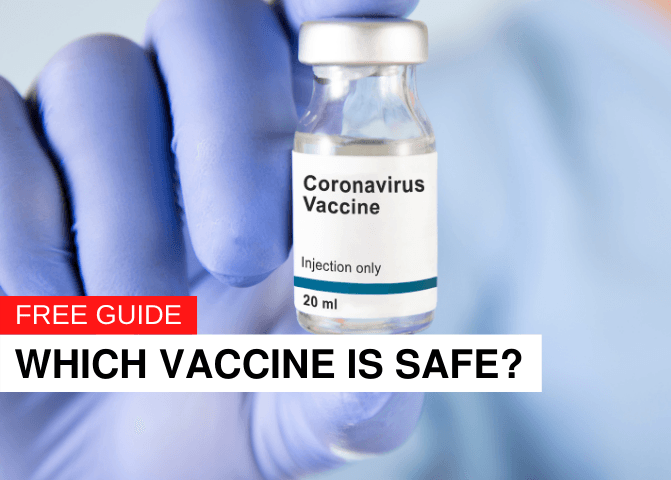The COVID-19 Vaccines – Which Covid Vaccine Is Best?

What is Covid-19? What vaccines are available? How safe are they and are there any side effects? Learn all you need to know about the options available.
Table of Contents
What is COVID-19?
To understand which covid vaccine is safe for you, let’s get a quick overview of the virus. COVID-19 is the scientific name of respiratory disease caused by a new type of coronavirus. ‘CO’ in COVID-19 means corona, ‘VI’ means virus and ‘D’ stands for disease. Meanwhile, 19 denotes the year in which its first case was reported. The COVID-19 virus is a new virus linked to the same family of viruses as Severe Acute Respiratory Syndrome (SARS) and some types of common cold.
The virus affects your upper respiratory tract as well as lower respiratory tracts. The parts of the respiratory system affected are the nose, sinuses, throat, windpipe and lungs. It spreads mainly by an infecting person spreading out droplets containing coronavirus and another person near to them inhaling it or the droplets simply landing on the eyes, nose or mouth of the nearby persons. Its main signs and symptoms include fever, cough, shortness of breath, body aches, loss of smell and taste.
Living with a Chronic Disease? – You’re Not Alone.
- Learn how to achieve your best quality of life not defined by your disease.
Medmate provides free medical and lifestyle advice for patients.
- Get access to Australian doctors and pharmacists 24/7 to answer your questions.
- Free articles from health experts about evidence based management to prevent disease progression and complications.
- Your questions answered about natural therapies. Are they effective? Are they safe?
- Stop feeling isolated. Join other Australian patients in the Medmate Community below. We’re all in this together.

When did COVID-19 start?
Wuhan Municipal Health Commission, China, reported a cluster of cases of pneumonia in Wuhan, Hubei Province on 31 December 2019.
Why is COVID-19 so dangerous?
COVID-19 affects one of the main systems of your body: It damages the respiratory system (lungs). By damaging the respiratory system, it causes shortness of breath. This shortness of breath can exacerbate if a person is already suffering from any other medical disease. Older people are particularly susceptible to developing a severe form of COVID-19. Shortness of breath makes it difficult to breathe. Consequently, artificial respiration becomes necessary in such conditions. Ultimately, this infectious disease can put a person on a ventilator and lead to death from the severe lung infection.

COVID-19 leads to a severe pneumonia and respiratory failure.
Is the COVID vaccine a live vaccine?
Vaccines against coronavirus disease offer the best chance to end this pandemic. Various kinds of vaccines have been manufactured around the globe. Australia is rolling out the following vaccines:
Types of COVID-19 Vaccine:
Pfizer COVID-19 vaccine
It does not contain any live virus and it cannot give you COVID-19. It creates the genetic code for the spike protein of the virus. Your body makes copies of the protein and learns to recognize how to respond and fight off the a real COVID-19 infection. Protection starts about three weeks after the first dose. A second dose is given 21 days later. People aged 16 years and older can receive this vaccine. The Australian Technical Advisory Group (ATAGI) on Immunization recommends that the Pfizer vaccine is preferred in adults under 60 years.
AstraZeneca Vaccine
It does not contain any live virus and it cannot give you COVID-19. The vaccine uses a harmless adenovirus to bring the spike protein into your cells and allow your body to make copies of the spike protein. The immune system learns to fight a real virus by recognizing this spike protein. This vaccine can be used in people 18 years and above. In people 60 years and over, ATAGI continue to advise that the benefit of vaccination with AstraZeneca COVID vaccine outweighs the risks associated with vaccination. The AstraZeneca vaccine can be used in adults aged under 60 years where the benefits outweigh the risk for that individual and the person has made an informed decision based on an understanding of the risks and benefits. Two doses of AstraZeneca are taken, with a 4-12 weeks gap in between them.
Moderna Vaccine
It does not contain any live virus and cannot give you COVID-19. This is a mRNA vaccine, using a genetic code to make your body’s cells produce the coronavirus’ specific spike protein. Your immune system develops memory for this spike protein and when it encounters the real virus mounts a strong immune response. Moderna is approved for use in people aged 12 years and over. You need 2 doses of the Moderna vaccine, given at least 4 weeks apart. You may not be protected against COVID-19 until 14 days after your second dose.
What are the side effects of COVID-19 vaccines?
Patients may experience transient and relatively mild side effects that are often associated with any immunization. These side effects are very limited compared to the potentially devastating effects that COVID-19 can cause. These side effects include:
- Pain at the injection site
- Dizziness
- Fatigue
- Fever
- Chills
- Muscle pain
- Diarrhea
Severe side effects of the COVID-19 vaccines are possible but rare.

Get medications and pharmacy essentials home delivered with Medmate.
Will I get a blood clot from the vaccine?
There is less than 1% that you will get a clot – a very rare side effect of the AstraZeneca vaccine. Clots may occur in 4-6 people in every million people vaccinated.
You have a greater chance of thrombosis (blood clots) with COVID-19 infection than with the vaccine.
Therefore, the benefits of vaccination greatly outweigh the risk of thrombosis. However, to minimise this risk, Pfizer is the preferred COVID-19 vaccine for adults under 50 years of age, and for people with a past history of cerebral venous sinus thrombosis (a type of brain clot) or heparin induced thrombocytopenia (a rare reaction to heparin treatment), idiopathic splanchnic vein thrombosis (blood clots in the abdominal veins) or antiphospholipid syndrome with thrombosis.
Key Takeaway
If you are thinking about whether you should get the vaccine or not, the likelihood is that the benefits of the vaccines greatly outweigh the risks. The vaccine choice is dependent on your age and background medical risks. We strongly advise you to discuss vaccination options with your GP. Vaccination is voluntary and free.
Living with a Chronic Disease? – You’re Not Alone.
Learn how to achieve your best quality of life not defined by your disease.

Medmate provides free medical and lifestyle advice for patients.
- Get access to Australian doctors and pharmacists 24/7 to answer your questions.
- Free articles from health experts about evidence based management to prevent disease progression and complications.
- Your questions answered about natural therapies. Are they effective? Are they safe?
- Stop feeling isolated. Join other Australian patients in the Medmate Community below. We’re all in this together.
Join the Medmate Community!
Receive free expert health advice from Australian doctors and health advisors. Join the Medmate community now - just what the doctor ordered.
Health Information I Medication Education & Tips I Patient Stories & Videos.


